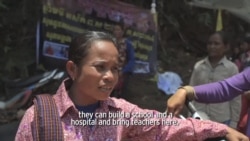Editor’s note: Award-winning filmmaker Kalyanee Mam submitted an essay to VOA Khmer to mark International Human Rights Day. It is accompanied by a short film she produced looking at the lives of the women of the Areng Valley, who oppose a proposed hydroelectric dam there they say endangers their way of life.
Today marks the 66th International Human Rights Day. Monks and human rights activists across Cambodia are marching from their respective provinces to convene at the National Assembly to submit petitions to elected lawmakers on indigenous people’s rights. To commemorate this day and this collective protest, I would like to honor the indigenous women warriors of Areng Valley, who are speaking out and fighting to protect their land from the construction of a controversial dam. If constructed, the dam would flood the entire valley and obliterate the livelihood, culture, and natural heritage of the Chong people, who have lived in this valley for at least 600 years. The dam would also destroy one of the richest and most bio-diverse areas that exists in Cambodia.
These women, like many women warriors in Cambodia, are fighting at the front lines of the protests. From the garment factory workers who are protesting for higher wages, to the Boeung Kak lake and Borei Keila activists fighting against forcible evictions, to the villagers across Cambodia who are fighting for their land and their livelihood, each of the women are asserting the same thing: We must protect our land and our homes, we must protect our families and our communities, we must protect what is at stake for the future of our grandchildren.
I recently spoke with Reem Sav See, one of the women activists in Areng Valley, while she was attending a human rights workshop in Koh Kong province. She says that some villagers have questioned her activism and outspokenness against the dam. They are afraid she will bring trouble to her family and the village. But she says she cannot stop fighting. This is her land, her village, her community, and her country and she must do everything within her power to protect it.
At the end of this short film, one of the elderly village women vehemently refuses to accept the compensation that would be given to her and other villagers if they agree to give up their land. “Even with all this money, I could only spend it in this life. I wouldn't be able to pass it on to my grandchildren. I just want my village and my land for the future of my grandchildren.”
What will we have to pass on to our grandchildren? I hope the riches we pass on are not monetary or material but a spiritual wealth that comes from a love of nature and the land, a wealth these women in Areng have in abundance and are fighting so hard to protect.
-----
Kalyanee Mam is a Cambodian-American filmmaker. Her debut feature-length documentary, “A River Changes Course,” about the struggles of three Cambodian families amidst a rapidly changing world, won the grand jury prize for world cinema documentary at the 2013 Sundance Film Festival.











